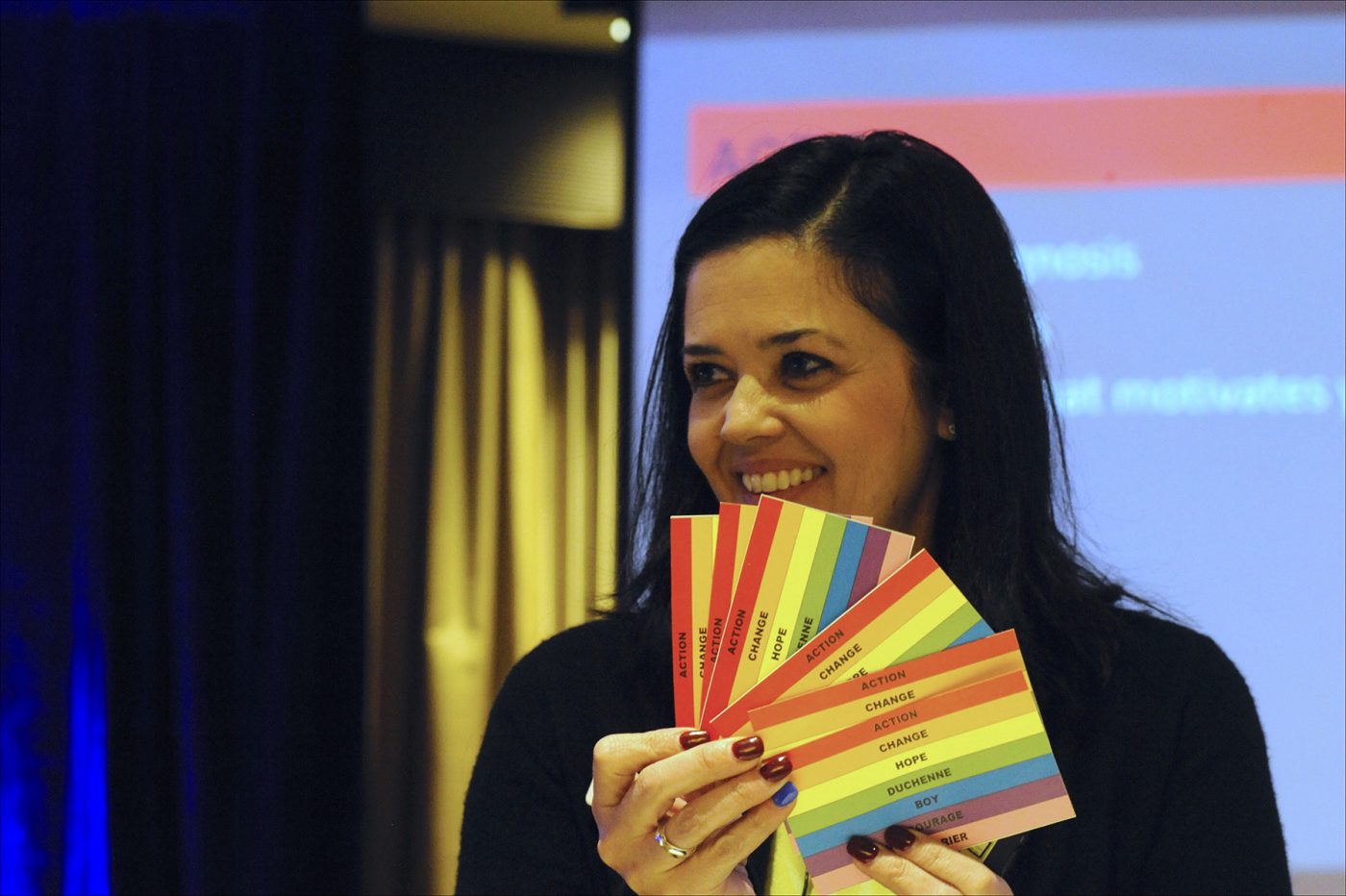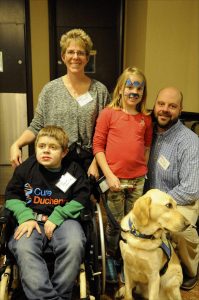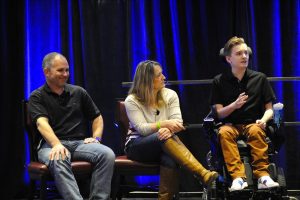Coping with Duchenne: Parents Swap Stories at ‘Futures’ Conference

Tiffany Cook is family resource manager at CureDuchenne. (Photo by Larry Luxner)
Until her son, Will, was diagnosed with Duchenne muscular dystrophy as a 7-year-old, speech pathologist Tiffany Cook had never heard of the disease.
Today, it’s literally her full-time job.
As family resource manager with the nonprofit organization CureDuchenne, Cook — who works from her home in Dallas — helps other moms and dads of newly diagnosed Duchenne boys navigate individualized education programs (IEPs), among other challenges.
“When I talk to families, it’s really about having open communication. Building that relationship is the most important thing,” she said. “It has to be a two-way street.”
Cook, 46, along with other moms of Duchenne patients spoke to Muscular Dystrophy News Today during CureDuchenne’s Futures conference, held Nov. 3–4 in Needham, Massachusetts.
Cook and her husband, Brian, knew something was wrong when they noticed that Will’s younger sister, Emily, was doing things Will simply couldn’t do.
“When Will was 5 and Emily was 2, she could jump up into our Suburban, and he struggled. We noticed that he walked on his toes,” Cook said. “An orthopedist said maybe he had heel cord tightening. We were trying to figure out what was going on. We had all those little signs, but nothing led to Duchenne until we took him to a gastroenterologist after Will was having diarrhea multiple times a day for eight days straight.”
That doctor suspected Crohn’s disease, but it was a pediatric neurologist in Boca Raton, Florida — where the couple was living at the time — who ordered the disease-specific tests and correctly diagnosed Will on Sept. 11, 2007.
“It crushed me. It crushed all of us, finding out through the back door,” Cook said. “We had a really difficult time finding a doctor who knew what Duchenne was. We started out with the MDA [Muscular Dystrophy Association] clinic in Palm Beach, then went to a clinic at the University of Miami, which had experience with ALS but not Duchenne. We never got the answers we were looking for.”
An expensive disease
When the Cooks moved to California, they connected with and became close friends of CureDuchenne co-founders Paul and Debra Miller, whose son, Hawken, has the disease.
Unlike Hawken, Will does not take steroids.
“He did not like the way it made him feel,” Cook said. “We had many heart-to-heart conversations with his doctor, Brenda Wong, and she let him take charge.”
Her son is being treated with the heart medications spironolactone, lisinopril and carvedilol — therapies she also uses, she said, since as a Duchenne carrier she has cardiomyopathy.
“Science has caught up to this disease,” Cook said. “When I first started looking into Duchenne, there was nothing. We were told that he would be dead by 25. But his heart’s still in fairly decent shape.”
Will, now 18, lost the ability to walk two years ago. That meant buying a $50,000 power wheelchair, a cost not fully covered by her insurance company.
“It was delivered to our home, and while my son was sitting in it, they called and said we owed another $3,000 — and that if we didn’t pay immediately, they’d have to take the chair back,” she said.
Cook estimates that she and her husband have spent about $250,000 since 2007 on equipment, necessary modifications to their home, and “traveling to doctors who know what they’re doing.”
No more ‘wallowing in our sorrow’
Lisa Shortlidge of Derry, New Hampshire, is also the mother of a 10-year-old, David, diagnosed with Duchenne in 2012.
“He didn’t walk until he was 3, so we kind of figured something was going on. We were told he had low muscle tone,” said Shortlidge, who also has a healthy 8-year-old daughter, Emaline.
“We started to get worried when he wasn’t sitting up at a year old, so they told us to see a genetic doctor to rule out a bunch of things. After getting the diagnosis, we realized we couldn’t wallow in our sorrow anymore, but had to do something.”
Shortlidge is a licensed nursing assistant; her husband, Joel, works for Fidelity Investments. For the last six years, she’s taken part in a triathlon with the Jett Foundation to raise money for Duchenne research. Both parents also do an annual, three-day and 250-mile fundraising bicycle ride taking them from the Canadian border south to New Hampshire’s Atlantic coast.
“We do a lot of networking on Facebook, and we’ve met tons and tons of families through the Jett Foundation and MDA [Muscular Dystrophy Association] of New Hampshire, which has been phenomenal,” she said. “They’re like family to us.”
For now, David uses a wheelchair for long distances and takes Emflaza (deflazacort). The boy is usually accompanied by his dog, Bandit. Obtained at no cost thanks to the nonprofit group Canine Companions for Independence, Bandit — part yellow lab and part golden retriever — helps David with simple everyday tasks.
The fifth-grader — who has difficulty paying attention — gets physical therapy and speech therapy at school, where he’s in a self-contained classroom with a one-on-one aide at all times.
“He had trouble climbing up stairs. Then he started on steroids and was able to do it. But he’s been on steroids for five or six years and now he’s regressing. I’m not sure if it’s plateaued,” she said. “David has a nonsense mutation, so we’re trying to get him into a trial right now for ataluren [Translarna, being developed by PTC Therapeutics] to see if it would benefit him.”
Advice for Duchenne parents
Sheryl and John Marrazzo of Hudson, Massachusetts, face similar challenges. Their 15-year-old son, Jake, was diagnosed with Duchenne in January 2011, just before his eighth birthday.
“We couldn’t move, so we had chair lifts installed, which insurance didn’t cover,” Sheryl Marrazzo said. “We wanted to put in an elevator, which is very expensive. We’re talking $40,000 or $50,000, and we didn’t have that kind of money in the bank. So we had to tell our story.”
Marrazzo started her own foundation, 4 Jake’s Sake and soon began talking with reporters with local newspapers and TV stations.
“We said we needed this elevator so Jake can get to all the levels of his home. My family put together a big gala, where we raised half the money,” she said. “The people you least expect you to help end up helping you the most.”
This 52-year-old mom competed in the Title 9 Sprint Triathlon in Hopkinton, Massachusetts, in September, pulling Jake in a raft for a quarter-mile swim, then pulling him in a custom-designed race chair for a 10-mile bike ride, and finally pushing him for three miles in the race chair.
Marrazzo offered some advice for other Duchenne parents who want to publicize their cause.
“Be honest with your story — the good, the bad, and the ugly — get your community to rally behind you and tap into resources of family and friends,” she said. “Make friends with newspaper reporters, and tell your story and why this will help your child with Duchenne.
“We really struggled for many years to get what we needed, but I find that being reasonable gets you more than being angry.”









